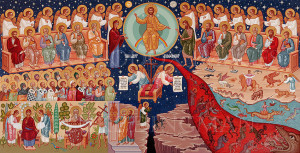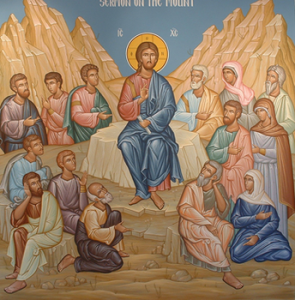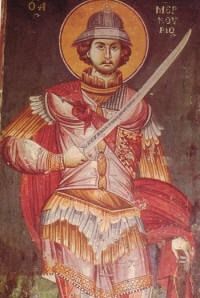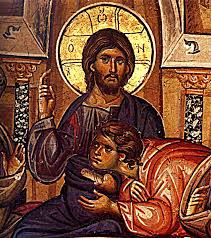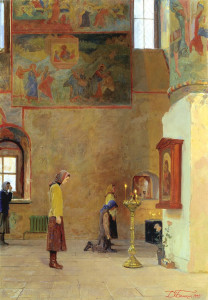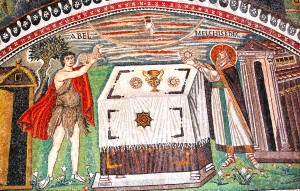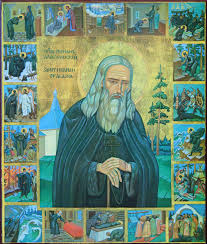17 October OS 2018 – Tuesday of the 5th Week of St. Luke; Holy Prophet Hosea, Holy Monk-Martyr Andrew of Crete, Holy Unmercenaries Cosmas and Damian of Cilicia
In today’s Gospel, the Lord calls upon us to confess Him before men:
The Lord said to His disciples: If any man will come after me, let him deny himself, and take up his cross daily, and follow me. For whosoever will save his life shall lose it: but whosoever will lose his life for my sake, the same shall save it. For what is a man advantaged, if he gain the whole world, and lose himself, or be cast away? For whosoever shall be ashamed of me and of my words, of him shall the Son of man be ashamed, when he shall come in his own glory, and in his Father’s, and of the holy angels. But I tell you of a truth, there be some standing here, which shall not taste of death, till they see the kingdom of God. – Luke 9: 23-27
If we desire to follow Christ, we have to take up our cross – daily, as St. Luke records the Lord saying – and follow Him. Part of this daily cross is not to be ashamed of Jesus Christ and His Gospel before other people, which is actually a tall order, because we are very prone to cringing before the opinion of society – we want others to like us, or at least we want to avoid conflict with them. But if we are to be true Christians, conflict is inevitable, for the world is at war with God.
St. Theophan the Recluse laments over the fact that no one talked about God or salvation in the fashionable Russian society of his day:
Do not be ashamed to confess the Lord Jesus Christ as the Incarnate Son of God, Who redeemed us through His death on the Cross, Who through His Resurrection and Ascension opened for us the entrance into the Kingdom of Heaven. If you are ashamed, then He will be ashamed of you “…when He shall come in His own glory, and in His Father’s, and of the holy angels.” Now it ahs become fashionable in society not to talk at all about the Lord and about salvation, whereas in the beginning these precious subjects were all that people talked about. One’s talk more readily flows from the place where the heart abides. Can it really be that people’s hearts abide less with the Lord? Judging from the talk, this must be the case. Some do not know Him at all, and others are cold toward Him. Fearing encounters with such people, even those who are warm toward the Lord do not direct conversation toward Him, and the priesthood is silent. These days, discussion about the Lord and Savior and about our main concern – salvation – is excluded from the range of conversation acceptable in society. “What?” you say, “Is that really all we’re supposed to talk about? Why only about that?” It is possible to talk about anything, but it must be done in a way that is underscored by the spirit of Christ. Then it would be possible to guess whether the speaker is a Christian or pagan. Now, however, it is impossible to guess what they are, either by their talk or by their writings. Look through all the periodicals – what don’t they write about? But no one wants to make Christian conversation. Strange times! – Thoughts for Each Day of the Year, pp. 231-232
In our own experience in American life, of course, we do meet people who want to “talk religion,” but usually their ideas are so inadequate, strange, or even blasphemous that it is painful to talk with them; we feel that we are casting our pearls before swine. What to do? I think that what is left to us is the constant struggle for prayer, so that we are ready to say a good word in season when the occasion arises. If we always are abiding in the Lord, then the people in front of us will, as St. Theophan says, be able to discern that we are Christians, and they will respond to us accordingly. It may be that people with a genuine thirsting spirit, with the fear of God, will cross our path, and that we must be ready to respond to them. May God grant!
If in our inevitable run-ins with unbelievers and freethinkers, someone says a blatant untruth about God, about the Christian faith, we simply have to say, “That is not true.” We do not have to engage in argument, but simply confess our faith: “I believe in the Holy Trinity, in Christ, in the Orthodox Faith, and in everything the Church teaches.” If they want you to explain, and you do not feel up to the task, give them your priest’s email address or telephone number. If they are serious, they will contact him. If they are worthy people, they will respect you for sticking to your guns when they see that you are serious.
The important thing is not to be skilled apologists but to be courageous confessors. This takes few words but much faith, with peace of heart. The world is going its way: let it go! We must go our way. This thought should give us peace in the midst of the turmoil and spiritual barrenness of contemporary life.

